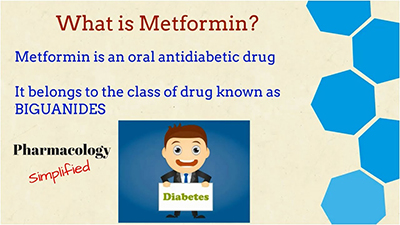
3. Metformin- New Insights on an Old Drug |

![]() Canadian and British researchers have discovered how the frontline Type 2 diabetes drug metformin may work to help cells better take up and use glucose. Their study, published in the journal Cell, may also explain other potential beneficial effects of metformin for the prevention of a variety of chronic diseases, including cancers.
Canadian and British researchers have discovered how the frontline Type 2 diabetes drug metformin may work to help cells better take up and use glucose. Their study, published in the journal Cell, may also explain other potential beneficial effects of metformin for the prevention of a variety of chronic diseases, including cancers.
![]() To show that metformin appeared to make the cells act as if they are starved for the essential mineral iron, biochemists at Université de Montréal (UdeM) used a new method to simultaneously probe how all of a cell's biochemical processes respond to the presence of a drug. Collaborating with the researchers at the Francis Crick Institute in London, the UdeM team showed that metformin has a global effect on iron distribution in cells, resulting in alteration of essential biochemical processes.
To show that metformin appeared to make the cells act as if they are starved for the essential mineral iron, biochemists at Université de Montréal (UdeM) used a new method to simultaneously probe how all of a cell's biochemical processes respond to the presence of a drug. Collaborating with the researchers at the Francis Crick Institute in London, the UdeM team showed that metformin has a global effect on iron distribution in cells, resulting in alteration of essential biochemical processes.
![]() The novel technology that made this discovery possible was developed in the lab of lead author Stephen Michnick, a biochemistry professor at UdeM and holder of a Canada Research Chair in cell architecture. According to him, today there are several ways to survey everything that is happening in the cells at once. But their method, called hdPCA, he says, has the merit of being extremely simple to perform and interpret, non-invasive and inexpensive; and can be done in almost any lab. The method can be deployed to rapidly predict and confirm how a drug might affect cells and simultaneously identify any liabilities the drug might have if introduced into humans.
The novel technology that made this discovery possible was developed in the lab of lead author Stephen Michnick, a biochemistry professor at UdeM and holder of a Canada Research Chair in cell architecture. According to him, today there are several ways to survey everything that is happening in the cells at once. But their method, called hdPCA, he says, has the merit of being extremely simple to perform and interpret, non-invasive and inexpensive; and can be done in almost any lab. The method can be deployed to rapidly predict and confirm how a drug might affect cells and simultaneously identify any liabilities the drug might have if introduced into humans.
![]() "We'd chosen to use metformin, mostly because it was an interesting test case, having no clear mechanism of action," added the study's first author, UdeM biochemist Bram Stynen. "The lead to effects of metformin on iron homeostasis was a bonus of this study. A connection between iron metabolism and diabetes was already suspected but no-one had ever showed a specific antidiabetic effect of metformin in living cells connected to iron homeostasis." Added collaborator Markus Ralser, a biochemist at Francis Crick, "this makes a lot of sense; glucose metabolism most likely emerged evolutionarily from iron-dependent chemical reactions; such chemical relationships don't disappear in evolution."
"We'd chosen to use metformin, mostly because it was an interesting test case, having no clear mechanism of action," added the study's first author, UdeM biochemist Bram Stynen. "The lead to effects of metformin on iron homeostasis was a bonus of this study. A connection between iron metabolism and diabetes was already suspected but no-one had ever showed a specific antidiabetic effect of metformin in living cells connected to iron homeostasis." Added collaborator Markus Ralser, a biochemist at Francis Crick, "this makes a lot of sense; glucose metabolism most likely emerged evolutionarily from iron-dependent chemical reactions; such chemical relationships don't disappear in evolution."
![]() The study entitled "Changes of cell biochemical states are revealed in protein homomeric complex dynamics " was financed by the Canadian Institutes of Health Research, the Natural Sciences and Engineering Research Council of Canada, the Human Frontiers Research Program, U.K. Medical Research Council, Cancer Research U.K., Wellcome Trust and the European Research Council.
The study entitled "Changes of cell biochemical states are revealed in protein homomeric complex dynamics " was financed by the Canadian Institutes of Health Research, the Natural Sciences and Engineering Research Council of Canada, the Human Frontiers Research Program, U.K. Medical Research Council, Cancer Research U.K., Wellcome Trust and the European Research Council.
For enquiries info@jothydev.net.
Please visit: jothydev.net | research.jothydev.com | diabscreenkerala.net | jothydev.com/newsletter
